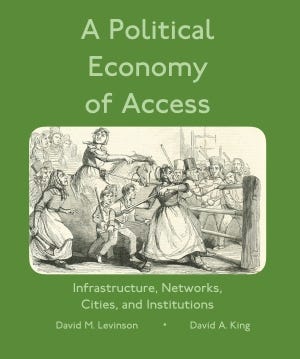Are environmental regulations truly transportation bottlenecks?
I recently had dinner with Fred Salvucci in Santiago Chile, among other topics, he talked about complaints about environmental regulation. He made a point any queueing theorist could appreciate. He argued that environment regulations are not slowing down transportation projects as a whole. There is only so much federal (and state) funding, and that is the real bottleneck. Loosening environmental regulations will not make any more projects get built in any given year.

A Political Economy of Access: Infrastructure, Networks, Cities, and Institutions by David M. Levinson and David A. King
UPDATE 9/16/2016
He adds " A further concern that I have is that many DOTs are most concerned with maximizing construction volume, so are likely tempted to skew their candidate projects towards the simpler to get through the environmental process. These projects may actually be the least important ones to actually implement, so there is likely a perverse outcome in terms of project portfolio."
Of course it may affect the sequence of projects, projects with more environmental problems, or more social impacts which induce well-heeled people to use environmental regulations as a roadblock, may get deferred for simpler projects without such problems. But shouldn't they in a functioning democracy?
If environmental costs are real, and we think they are, that should make projects more expensive in order to ameliorate such costs, either through avoidance of creating the damages in the first place, or compensating the losers. This higher costs reduces the number of projects that can be done with the money. So it goes. All the low hanging fruit was eaten years ago.
If those projects still pass a Benefit / Cost test after amelioration, then sure, build them. That is of course less likely than if transport investments export environmental costs to the health sector or agriculture, or property values, or anywhere else that it is not properly accounted for.

